Developer Workbench 2023
Use the Right Tool for the Job
Chant Developer Workbench
When building applications, it’s essential that you have the right tools to get the job done.
Now you can develop applications that speak, listen, and interact with users using Developer Workbench from Chant. You can easily manage conversations, grammars, lexicons, movement, profiles, speech, and text-to-speech markup directly within application software you develop. Chant Developer Workbench is comprised of tools and class libraries for integrating speech and natural user interface technology.
The Chant Developer Workbench toolset provides development and testing environment for working with:
- Audio Search,
- GrammarKit,
- KinesicsKit,
- LexiconKit,
- ProfileKit,
- SpeechKit,
- Speech Manager,
- Talk&Listen,
- VoiceMarkupKit, and
- VoiceXMLKit.
Interactive Development Environment
Chant Developer Workbench provides a comprehensive development and testing environment for working with speech and natural user interface technology that features:
- Multi-document, interactive, customizable environment;
- Powerful editor with color-coded formatting, intelliprompt, optional outlining, optional line numbers, undo-redo, word wrap, and find/replace;
- Resource browsers for testing; and
- Event tracing.
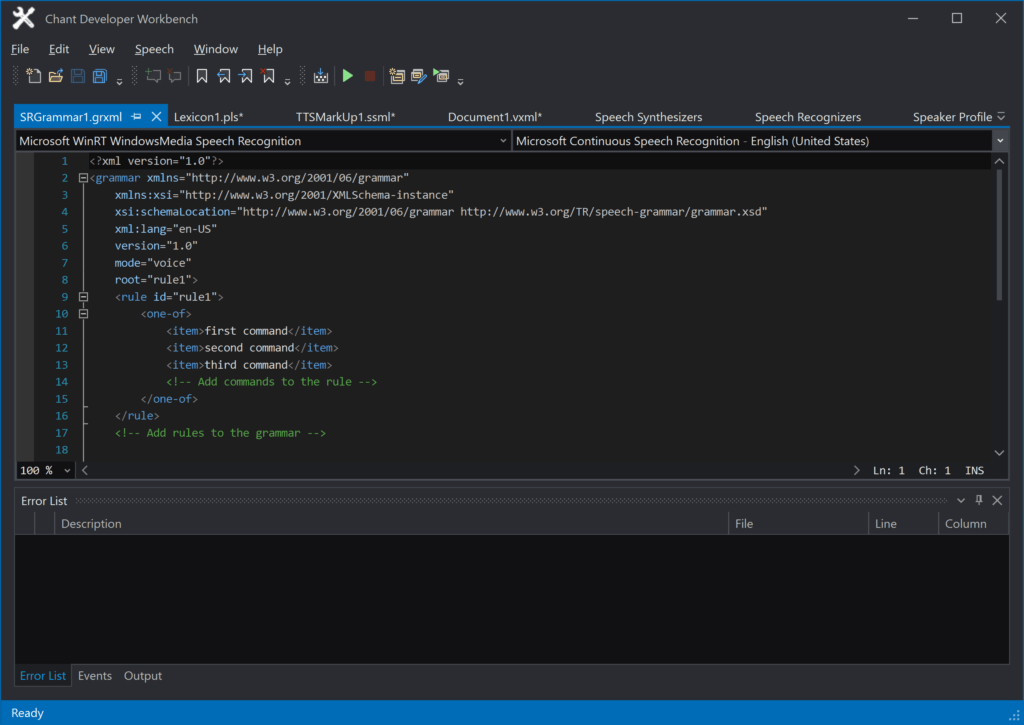
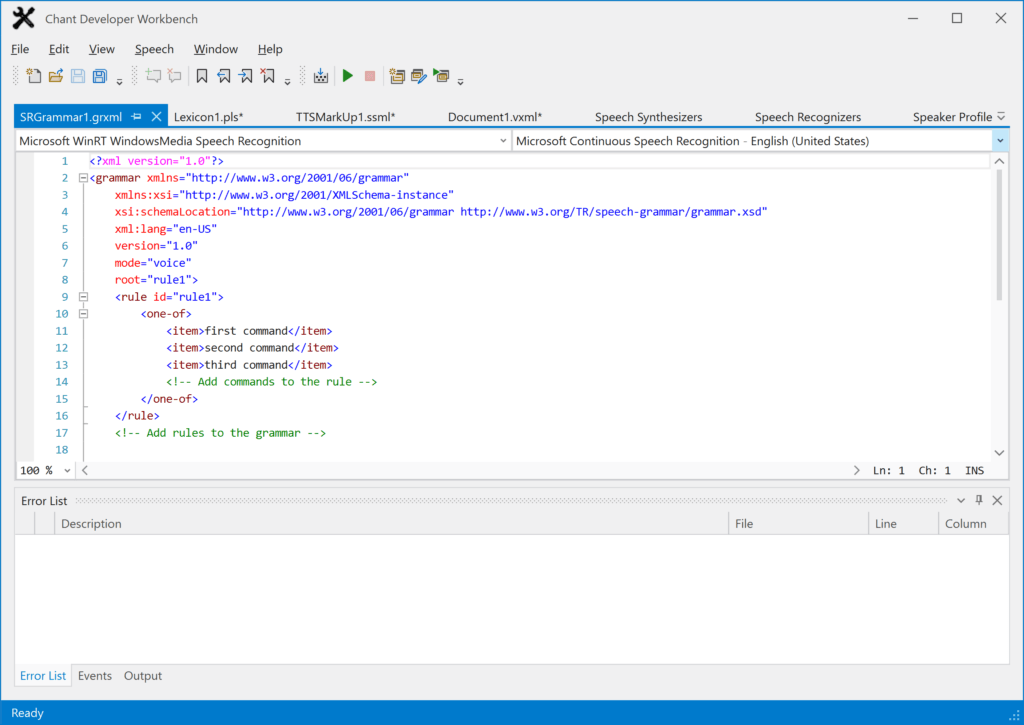
Interactive Development Environment
Chant Developer Workbench provides a comprehensive development and testing environment for working with speech and natural user interface technology that features:
- Multi-document, interactive, customizable environment;
- Powerful editor with color-coded formatting, intelliprompt, optional outlining, optional line numbers, undo-redo, word wrap, and find/replace;
- Resource browsers for testing; and
- Event tracing.
The tabbed-document interface provides for fast switching among multiple documents and browsers.
The editing environment is designed to accelerate speech technology grammar and markup development with built-in syntax checking and prompting.
The multi-docked windows layout is configurable to yield productivity for various development and testing scenarios.
Toolbars can be easily customized to display the facilities most often used.
Window layout and toolbar settings are persisted across executions.
Feature Summary
Chant Developer Workbench is comprised of essential tools and class libraries for developing software that speaks, listens, and interacts with users. It provides an IDE for developing and interactively testing speech and natural user interface technologies. You can manage conversations, grammars, movement, profiles, lexicons, speech, and text-to-speech markup directly within application software you develop and deploy.
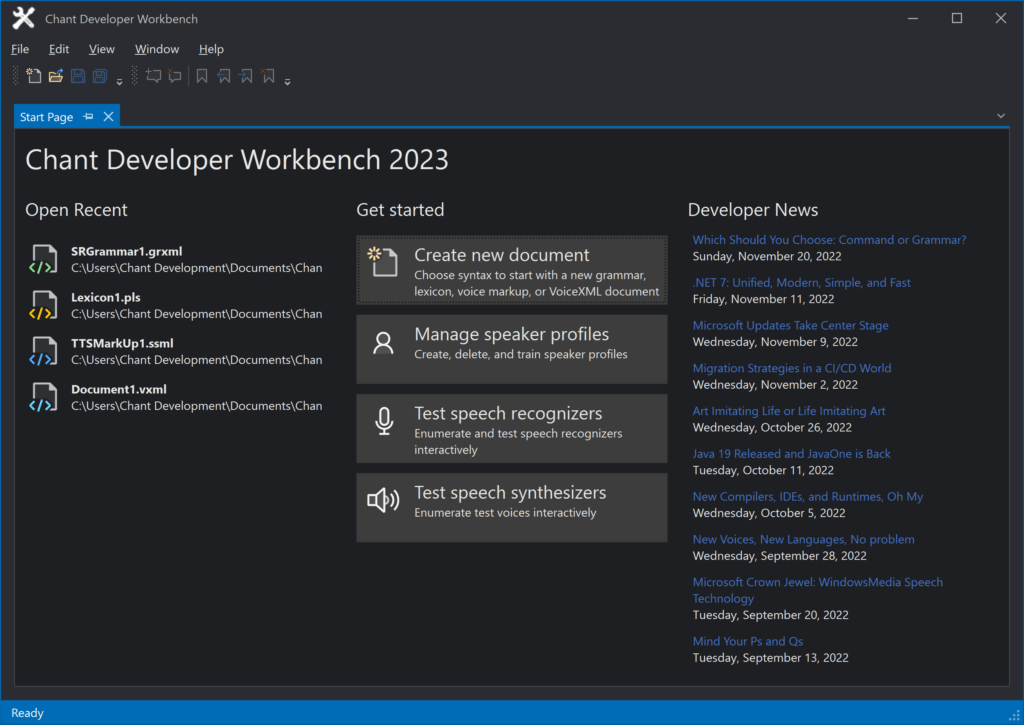

Design Grammars with GrammarKit
A GrammarKit application can:
- Compile and validate grammar syntax; and
- Persist compiled grammar binary.
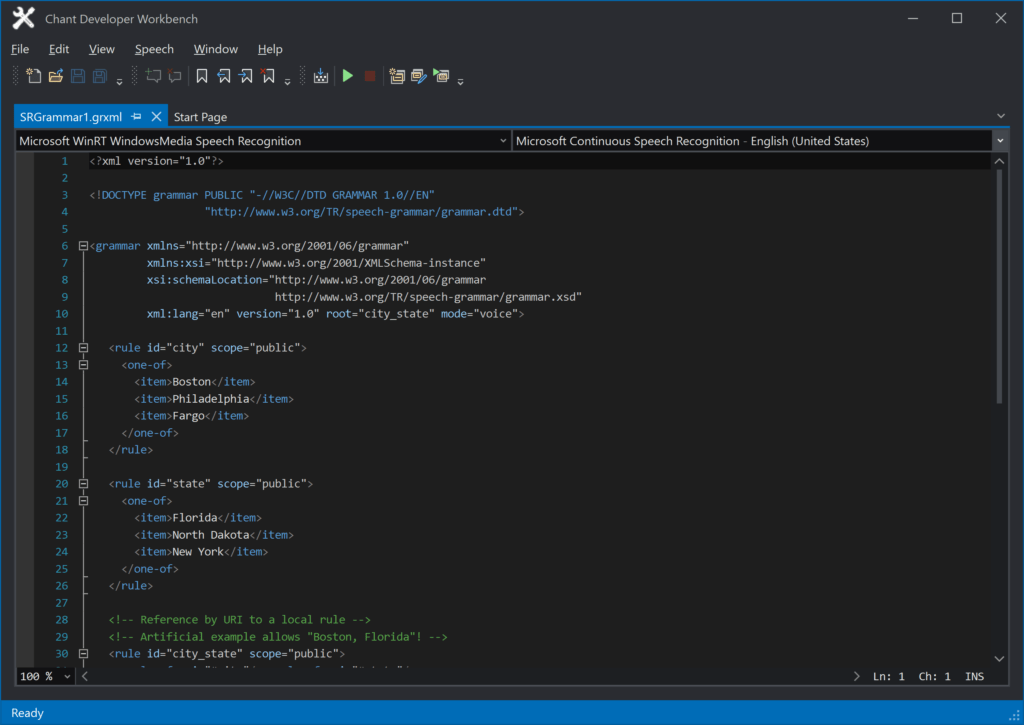
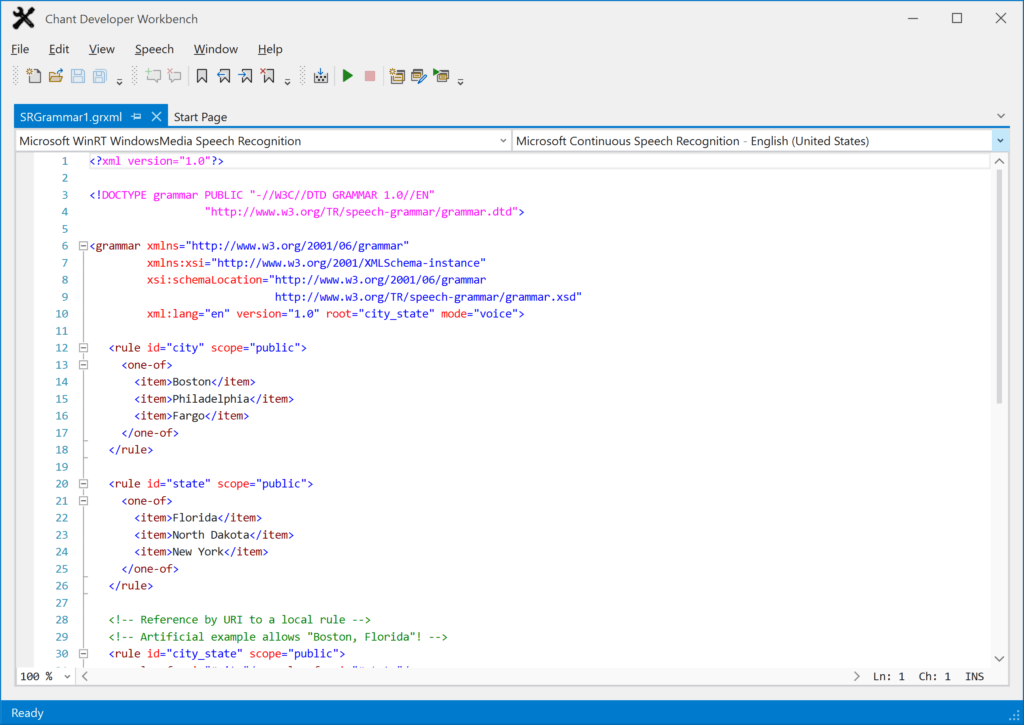
Within the Chant Developer Workbench IDE, you can:
- Create and edit grammars in native grammar syntax;
- Generate word pronunciation phonemes (requires LexiconKit);
- Edit word pronunciation phonemes (requires LexiconKit);
- Compile and debug grammars; and
- Test grammars with live audio (requires SpeechKit).
Track Movement with KinesicsKit
A KinesicsKit application can:
- Capture and map color, depth, and body data;
- Record and playback audio files; and
- Integrate movement tracking with speech technology.
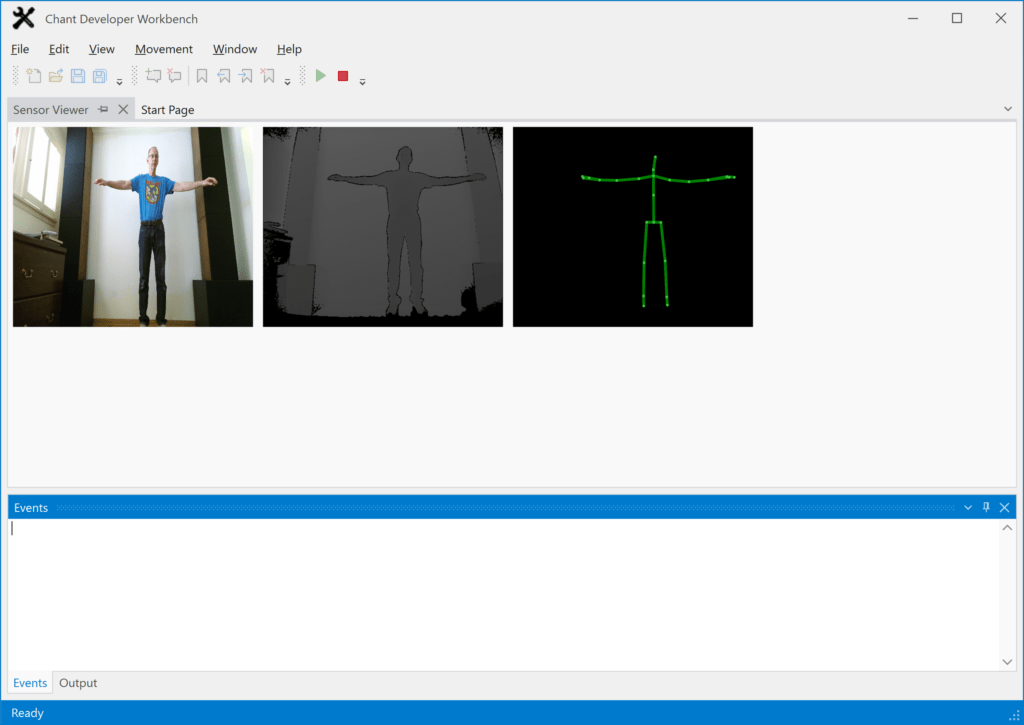
Within the Chant Developer Workbench IDE, you can:
- Render and analyze color, depth, and body data; and
- Validate sensor image streams.
Tailor Pronunciations with LexiconKit
A LexiconKit application can:
- Create and delete lexicon word pronunciations on demand; and
- Edit lexicon word pronunciations for ensuring maximum recognition accuracy and speech synthesis quality.
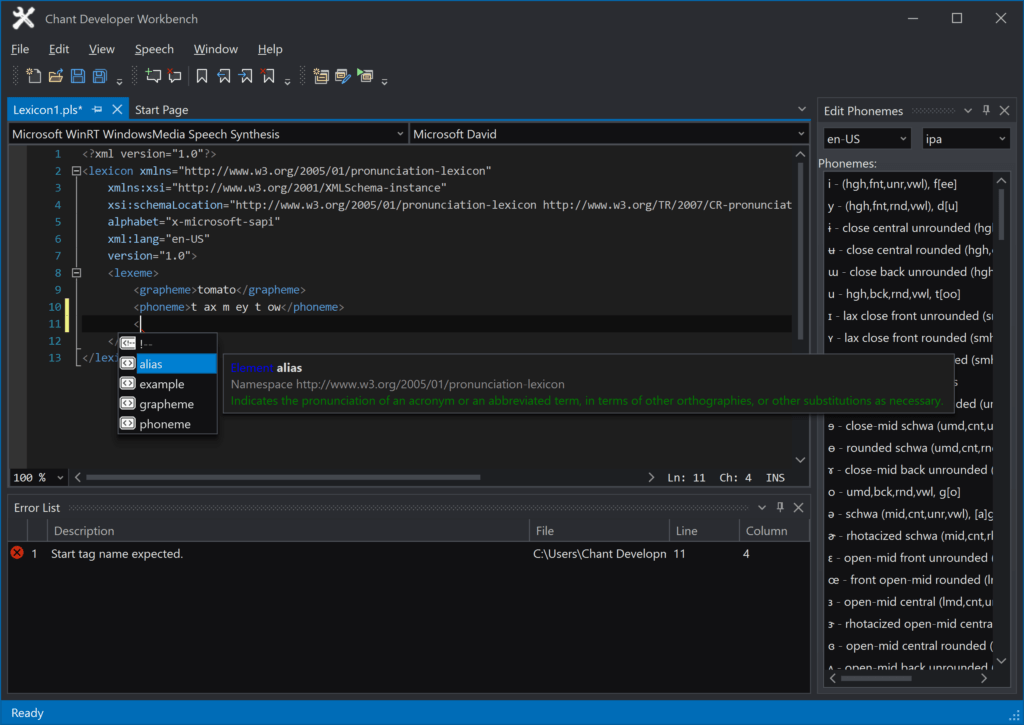
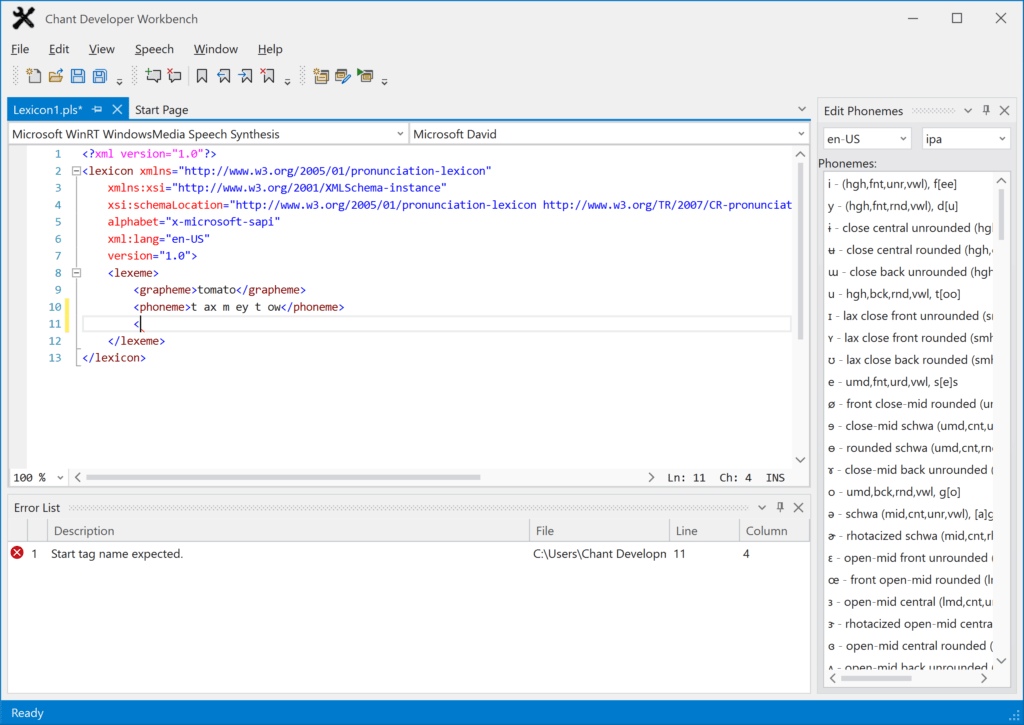
Within the Chant Developer Workbench IDE, you can:
- Create and edit W3C lexicons (.pls);
- Create and edit Cepstral lexicon file (.txt);
- Generate word pronunciation phonemes;
- Edit word pronunciation phonemes; and
- Speak word pronunciation phonemes.
Administer Speaker Profiles with ProfileKit
A ProfileKit application can:
- Create and delete speaker profiles on demand;
- Launch recognizer built-in dialogs;
- Customize speaker training.
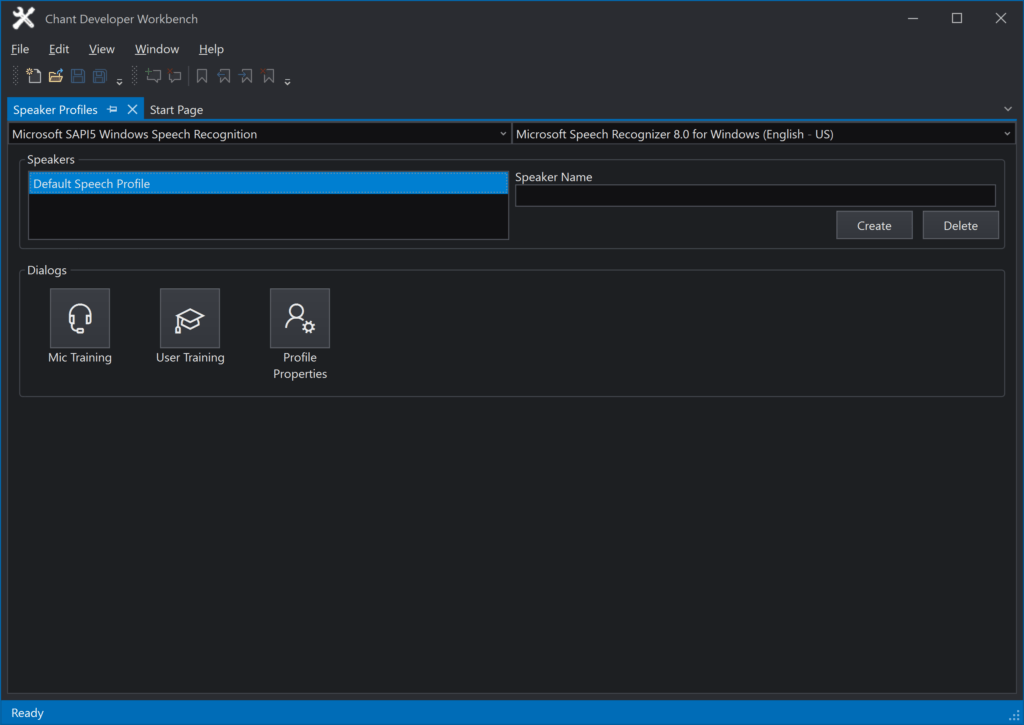
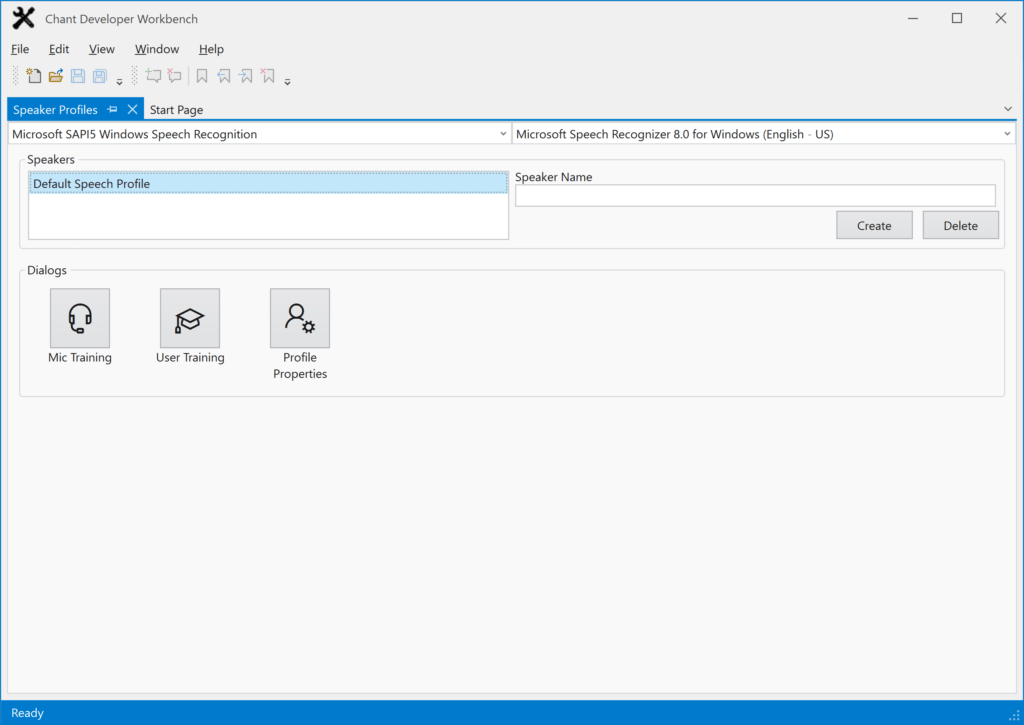
Within the Chant Developer Workbench IDE, you can:
- Create and delete speaker profiles;
- Enumerate speaker profiles; and
- Invoke recognizer built-in speaker training.
Recognize and Synthesize Speech with SpeechKit
A SpeechKit application can:
- Control application functions by speaking rather than having to use a mouse or keyboard;
- Prompt users for applicable data capture;
- Capture data by speaking rather than typing;
- Confirm data capture with spoken or audio acknowledgement;
- Transcribe audio files to text; and
- Synthesize speech to files.
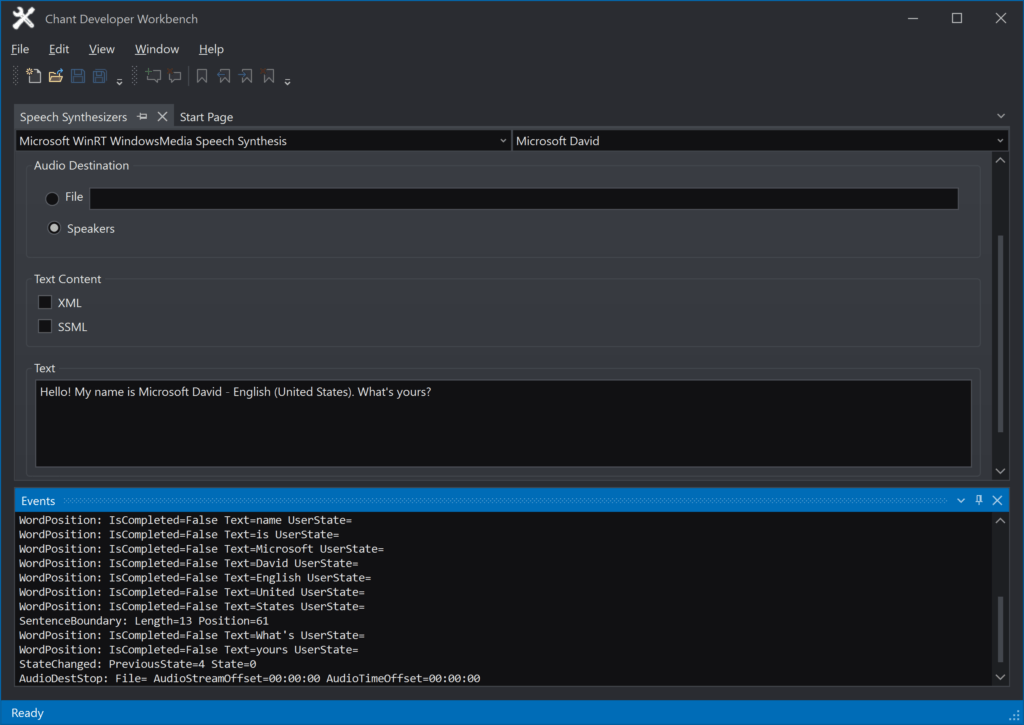
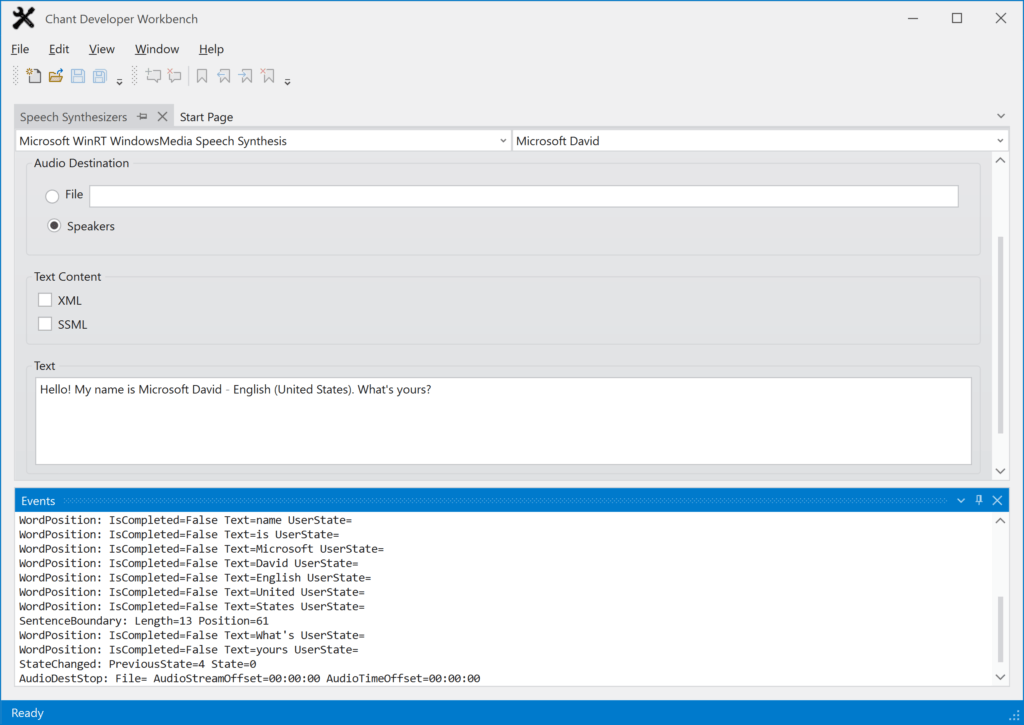
Within the Chant Developer Workbench IDE, you can:
- Enumerate speech engines for testing recognizer-, and synthesizer-specific features;
- Trace recognition and synthesis events;
- Support grammar activation and testing; and
- Support TTS markup playback.
Fine-tune Speech Synthesis with VoiceMarkupKit
A VoiceMarkupKit application can:
- Generate markup language in Acapela TTS Tag, CereProc CereVoice, Microsoft SAPI 5 XML, and W3C SSML syntax; and
- Dynamically switch among speech APIs and syntax formats.
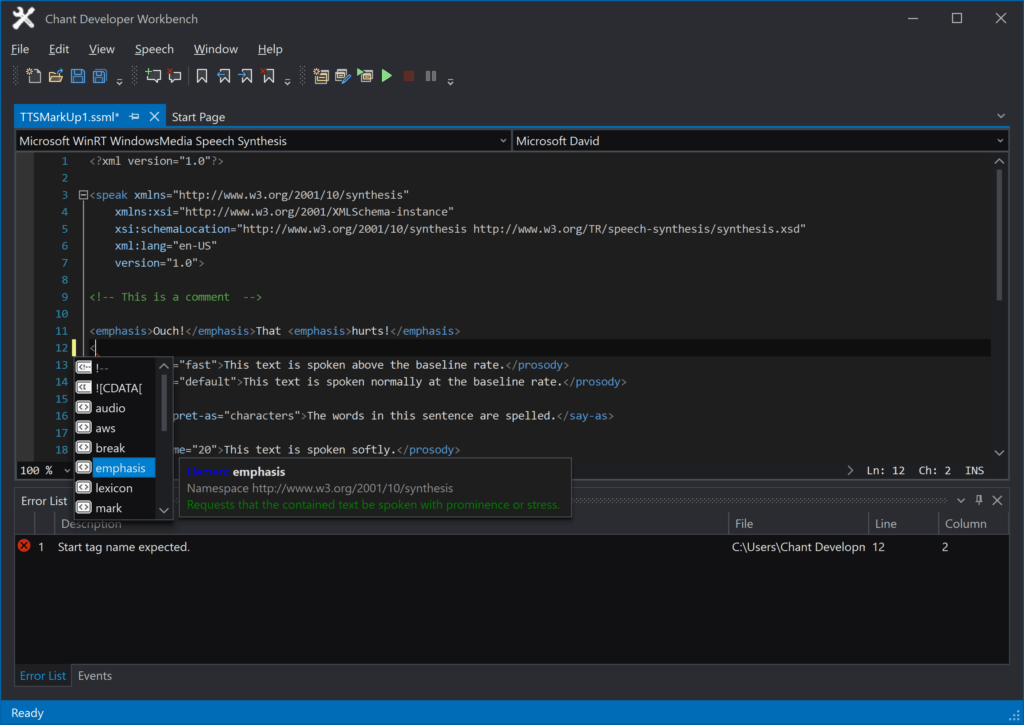
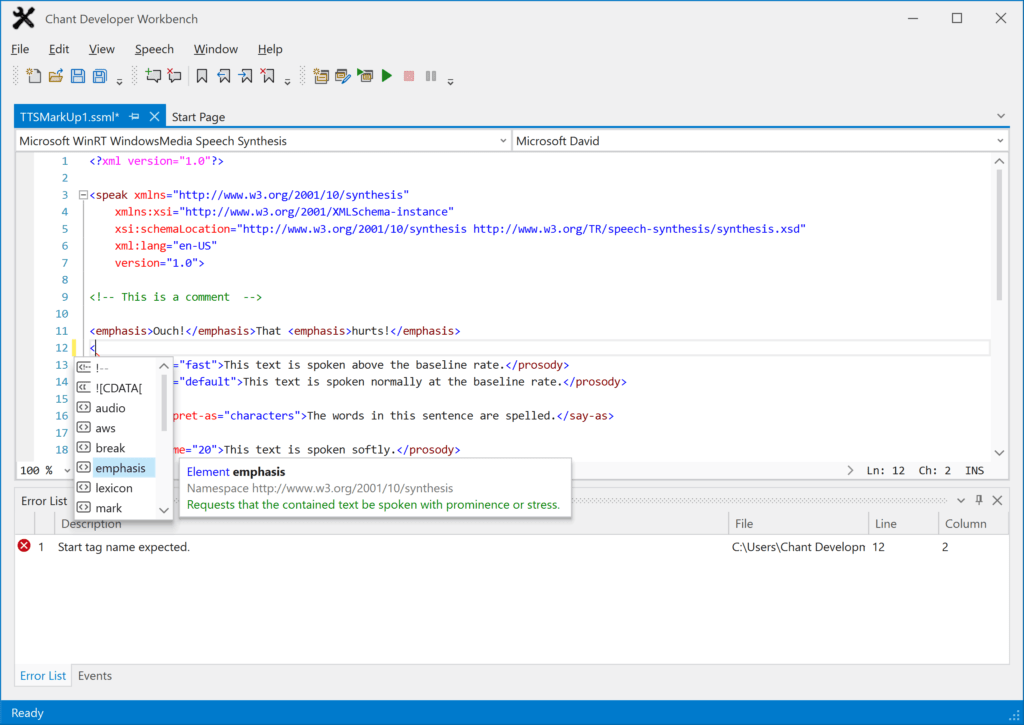
Within the Chant Developer Workbench IDE, you can:
- Create and edit documents with TTS markup;
- Generate TTS markup;
- Generate word pronunciation phonemes (requires LexiconKit);
- Edit word pronunciation phonemes (requires LexiconKit); and
- Playback text with TTS markup (requires SpeechKit).
Enrich Conversations with VoiceXMLKit
A VoiceXMLKit application can:
- Validate VoiceVXML syntax; and
- Interpret VoiceXML documents.
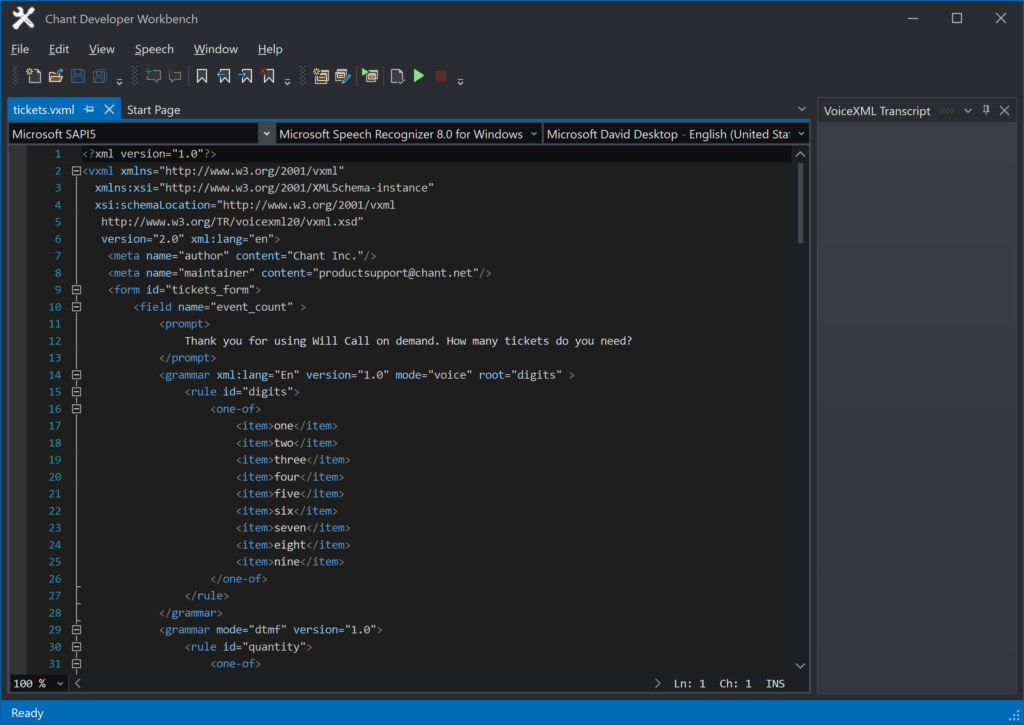
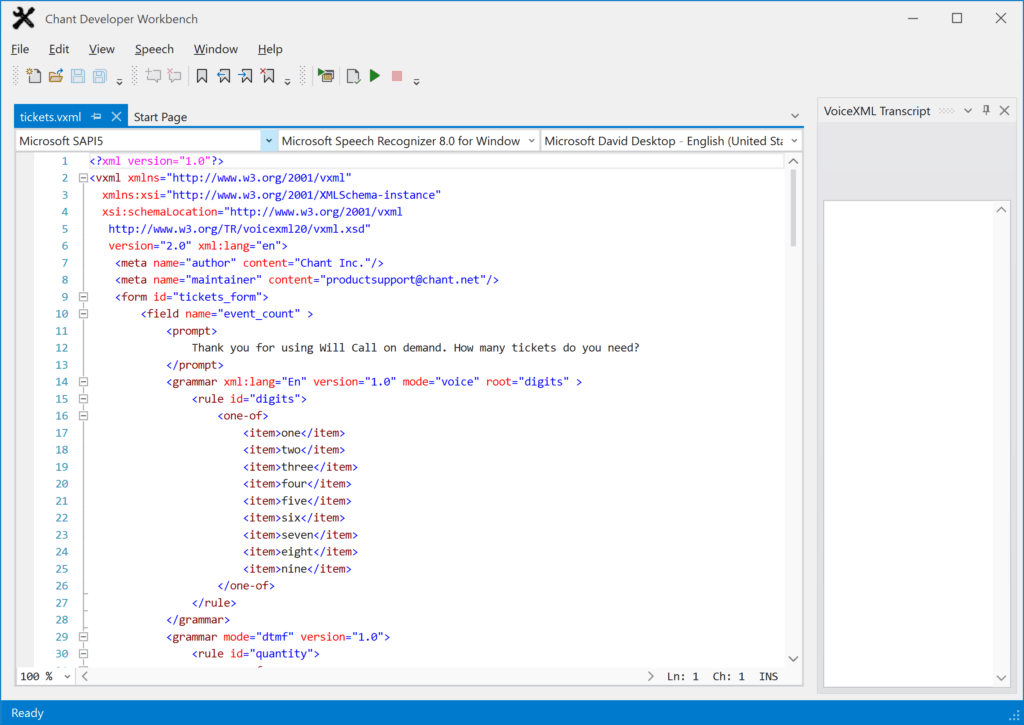
Within the Chant Developer Workbench IDE, you can:
- Create and edit VoiceXML documents;
- Test VoiceXML documents with microphone audio and keypad data; and
- Trace runtime events.
Chant Developer Workbench License
You may explore the capabilities of Chant Developer Workbench for 30 days. To continue to use the product after 30 days, you must purchase a license for the software or stop using the software and remove it from your system.
A valid purchased license gives you the right to construct executable applications that use the applicable class library and distribute it with executable applications without royalty obligations to Chant.
The Chant Developer Workbench license is a single end-user license. Each developer who installs and uses Chant Developer Workbench to develop applications must have their own license.
Chant Developer Workbench license includes Audio Search, GrammarKit, KinesicsKit, LexiconKit, ProfileKit, SpeechKit, Speech Manager, Talk&Listen, VoiceMarkupKit, and VoiceXMLKit class libraries. The class library names vary by platform: Windows 32-bit and 64-bit. This helps ensure the correct library is deployed with your application.
You may purchase a license for Chant Developer Workbench on-line at the Chant store or through your preferred software reseller.
Chant Developer Workbench System Requirements
Development Environment
- Intel processor or equivalent,
- Microsoft Windows 10, 11
- Apple MacOS Catalina+,
- Microsoft .NET 6.0 (x86 and x64 CDW Editions),
- 1.5 GB of hard drive space,
- VGA or higher-resolution monitor,
- Microsoft Kinect for Xbox One sensor,
- Microsoft Kinect Adapter for Windows,
- Microsoft Kinect for Windows SDK 2.0,
- Apple Speech, Google android.speech, Microsoft Azure Speech, Microsoft SAPI 5 compatible, Microsoft Speech Platform, Microsoft WindowsMedia (UWP and WinRT), or Nuance Dragon NaturallySpeaking recognizer,
- Acapela, Apple AVFoundation, Cepstral, CereProc, Google android.speech.tts, Microsoft Azure Speech, Microsoft SAPI 5 compatible, Microsoft Speech Platform, or Microsoft WindowsMedia (UWP and WinRT) synthesizer,
- Android, C++, C++Builder, Delphi, Java (JDK 1.8, 11, 13, 14, 15, 16, 17, 18, 19), .NET Framework (4.5+, 3.1, 5.0, 6.0, 7.0), Objective-C, Swift development environments, and
- close-talk microphone.
